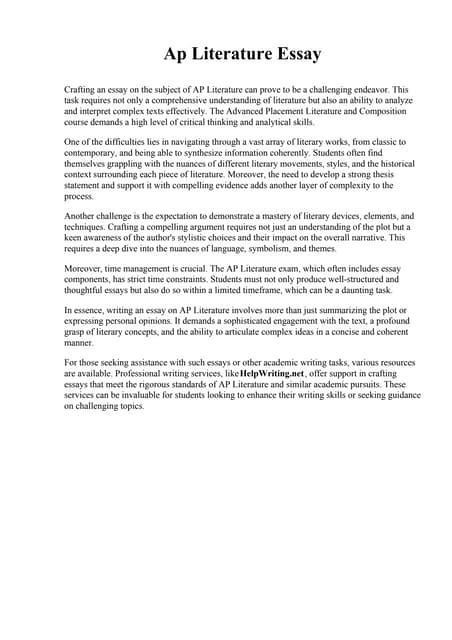Introduction:

The Advanced Placement (AP) Literature exam is a rigorous assessment that challenges students to analyze and interpret literary works with depth and sophistication. The essay component of the exam requires students to demonstrate their critical thinking skills, writing proficiency, and understanding of literary devices and techniques. To excel in this essay, it is crucial to develop a strong understanding of the essay prompts and how to approach them effectively.
The AP Literature essay prompts are typically structured around a central theme or question that the student must address in their response. Common prompt types include:
-
Analysis Prompts: These prompts ask students to analyze a specific aspect of a literary work, such as a character, theme, or literary device.
-
Interpretation Prompts: These prompts require students to interpret the meaning and significance of a literary work as a whole.
-
Synthesis Prompts: These prompts combine analysis and interpretation by asking students to connect two or more literary works and discuss their similarities, differences, or relationships.
Crafting Stellar AP Literature Essay Responses:
1. Understanding the Prompt:
Thoroughly read and understand the essay prompt. Identify the key words and phrases that indicate the type of analysis or interpretation required.
2. Selecting Strong Evidence:
When selecting evidence from the text to support your analysis or interpretation, choose passages that are relevant to the prompt and provide specific examples of the literary devices or techniques being discussed.
3. Developing a Clear Thesis Statement:
Your thesis statement should be a concise and arguable statement that clearly articulates your main argument and establishes the focus of your essay.
4. Building a Logical Structure:
Organize your essay in a logical manner, using paragraphs to develop different aspects of your argument. Use transitions to connect your ideas smoothly.
5. Using Precise Language:
Employ precise and specific language when describing literary devices and techniques. Avoid vague or general terms.
6. Engaging with Complexity:
Show your understanding of the complexity of the literary work by acknowledging different perspectives and interpretations.
7. Revising and Editing:
Once you have completed your essay, take time to revise and edit it carefully. Check for grammar and spelling errors, as well as clarity and conciseness.
Sample AP Literature Essay Prompts and Analysis:
Prompt: Analyze the significance of the setting in Harper Lee’s “To Kill a Mockingbird.”
Analysis:
In Harper Lee’s “To Kill a Mockingbird,” the setting plays a pivotal role in shaping the themes and characters of the novel. The small town of Maycomb, Alabama, exemplifies the social and racial tensions that permeate the story. The oppressive heat and humidity mirror the stifling atmosphere of the town’s racism and prejudice. The evocative descriptions of the natural surroundings, such as the Mockingbird’s song and the Radley Place, contribute to the symbolic and allegorical elements of the novel.
Prompt: Interpret the symbolism of the Yellow Wallpaper in Charlotte Perkins Gilman’s short story of the same name.
Analysis:
In Charlotte Perkins Gilman’s “The Yellow Wallpaper,” the Yellow Wallpaper is a powerful symbol of the narrator’s mental and emotional state. The wallpaper represents the oppressive and suffocating nature of her confinement and the restrictions imposed on women in the Victorian era. The narrator’s obsession with the wallpaper reflects her increasing isolation and descent into madness. The imagery of the wallpaper’s crawling patterns symbolizes the narrator’s paranoia and the encroaching darkness that consumes her mind.
Tips and Tricks for Success:
-
Practice regularly: Engage in regular practice writing essays to improve your analytical and writing skills.
-
Familiarize yourself with the texts: Thoroughly read and analyze the literary works that you may encounter on the exam.
-
Time management: Allocate your time wisely during the exam, ensuring you have sufficient time for planning, writing, and reviewing your essay.
-
Seek feedback: Share your essays with teachers, peers, or tutors for constructive criticism to identify areas for improvement.
Conclusion:
Mastering the AP Literature essay prompts requires a deep understanding of literary analysis, interpretation, and effective writing techniques. By following the strategies outlined in this guide, students can refine their ability to craft compelling and insightful essays that demonstrate their literary prowess. Remember to practice consistently, familiarize yourself with the texts, manage your time effectively, and seek feedback to maximize your preparation for the AP Literature exam.
